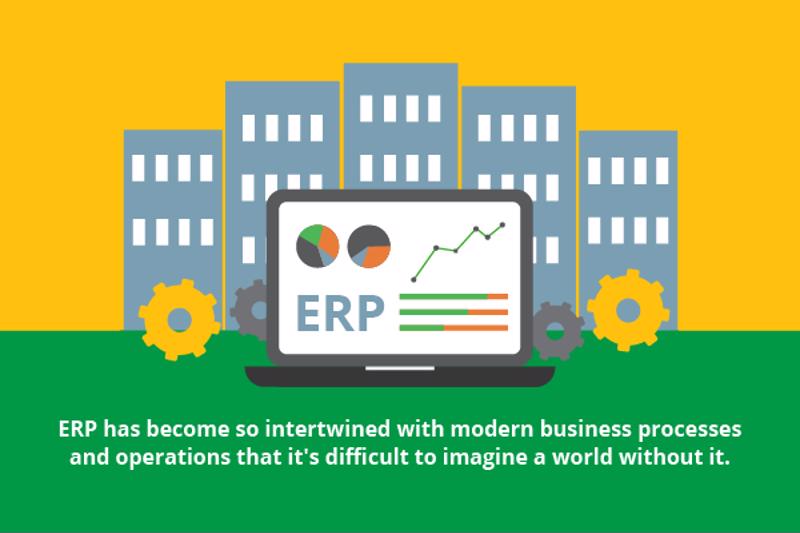Enterprise resource planning (ERP) software has been a familiar face in the business world for decades, helping companies coordinate and manage disparate business units, departments and processes. The term ERP may have been officially coined in the ’90s, but the roots of this technology go back even further to the mainframe-driven accounting systems of the ’70s and even the unsophisticated (by today’s standards) counting machines of the ’40s.
ERP has become so intertwined with modern business processes and operations that it’s difficult to imagine a world without it. Larger organizations — especially those that have an international footprint — depend on ERP systems to make sense of their complex inner workings, connecting supply chain management processes with financial and accounting workflows, customer relationship management systems, human resources platforms and much more.
In short, ERP makes efficient business operations possible on an enterprise scale. To take a page from “It’s a Wonderful Life,” let’s give ERP its proper due by taking a look at the gaping hole that would be left behind in the business community if it never existed at all. What would the world look like without an ERP system?

Supply chain delays become the norm
An efficient supply chain manages to do the seemingly impossible: seamlessly coordinate efforts between different systems and business units stretched out across the globe. Manufacturers always know when materials will be delivered and can schedule production accordingly, consignment managers maintain ideal inventory levels at all times and customers receive their orders quickly and on schedule.
All of that is only possible thanks to ERP systems that remove data silos and provide complete visibility across the entire enterprise. Without ERP, business units would be forced to essentially run in a vacuum, lacking any clear insight into what other departments were doing.
That would lead to a wide variety of problems, including extensive supply chain delays. The lack of coordination between manufacturers and suppliers would mean that raw materials may not arrive when expected, causing production to fall behind. In a similar vein, consignment managers would not be able to dynamically stock inventory, leading to situations where orders either cannot be fulfilled or are excessively delayed because products are on backorder.
Cost overruns are a fact of life
ERP systems give company stakeholders more visibility into virtually every facet of their business, maintaining efficient operations while bringing execution gaps to light. Without a far-reaching ERP solution in place, enterprises wouldn’t have those opportunities. Instead, they would likely find themselves spending far too much on core supply chain processes like inventory management and freight shipping.
Let’s revisit our beleaguered consignment manager who’s struggling to deliver products and materials to customers on time and on demand. There’s no ERP system to accurately report when new inventory will be delivered — moreover, the systems that are in place are so flawed that the consignment manager doesn’t have any faith in the scheduled timeline they do have.
Rather than risk upsetting and potentially losing customers waiting on delayed shipments, the consignment manager decides to continually overstock inventory. Products are always available, and the customer’s happy. But that inefficient approach to inventory management has a major impact on the company’s bottom line, as it ties up its capital in unneeded inventory.
In another corner of the supply chain, stakeholders may try to prevent delays by expediting freight shipping. Because the ERP system isn’t there to seamlessly coordinate efforts from one end of the supply chain to the other, business units find themselves falling behind and going to great lengths to minimize the fallout. Again, paying extra for faster shipping is good for the customer experience, but the company’s profitability certainly takes a hit.
In this ERP-less world, enterprises also miss out on many opportunities to remove inefficiencies, accelerate processes, increase productivity and do more with less. The extensive data and reports generated by leading ERP systems provide the insights needed to become leaner and make better use of personnel.
If all of this sounds like one bad nightmare, be thankful that we don’t live in a world without ERP systems. Inspirage’s experience implementing ERP solutions on a global scale is unparalleled, and we can help any organization make ERP the centerpiece of its operations.